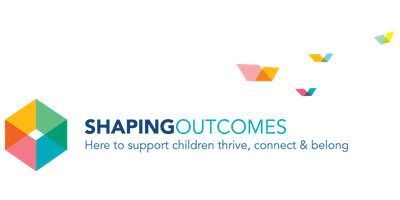SHAPING OUTCOMES FREE SERVICES
We understand how daunting it can feel to navigate your way through accessing services and funding for your child after they have been diagnosed with a disability. That is why we are offering 2 free services to support children and families. The first is a pre-planning service, to assist you with being organised for your NDIS planning meeting. Our other service is to help you understand your child’s NDIS plan once you receive it, contact us to find out more.
COMMUNITY FUNDED
These supports are completely funded through community grants, donations and government programs. Whilst we work hard to provide them at all times they are subject to funding availability.
MyTime groups provide local support for families and carers with a young child with a disability or chronic medical condition. Parents and carers can socialise and share ideas with others who understand the rewards and intensity of the caring role. Parents and carers can:
- Meet others in similar circumstances
- Have fun, hear from others and share experiences
- Find out about available community support
- Get extra parenting information and skills development
- Make time for themselves while children play, supported by a play helper.
Groups can choose topics and activities to discuss and explore with their group facilitator, while a play helper keeps children busy and active. Topics might include: taking care of yourself, getting the right support, your child’s development, and play ideas. Parents and carers who are receive the Carer Allowance (Child) for a young child with a disability or chronic medical condition are eligible to attend. Shaping Outcomes is funded to provide 16 x 3 hour Parent groups and 4 x 4 hour Family groups per year. MyTime is a FREE support, funded through Tresillian and Department of Social Services.
SELF-FUNDED WITH LIMITED COMMUNITY FUNDED PLACEMENTS
Any of these supports can be purchased at any time, however there are occasions when we will have received community funding to offer a limited number of children and families free supports under these categories. These funded placements are not guaranteed and are subject to funding availability.
A Key Worker Specialist will provide support in your child’s everyday environment – their home, school and community. These supports are purchased as 1 hour sessions.
Key Worker Specialist support can:
- Enable you to plan and implement individual education and therapy programs to meet your family’s goals
- Provide your family with support and enhance quality sibling, child – adult, adult – adult relationships
- Share information about learning and development
- Assist your child to develop a joy of learning and a positive sense of self as a learner, leading to independent learning and enabling optimal outcomes.
The Key Worker Specialist will:
- Complete an observational assessment of the child and their environment (relationships and routines)
- Provide modelling and consulting
- Assist with goal-setting
- Provide service coordination.
Please contact Shaping Outcomes for more information.
Key Word Sign is a simplified form of manual signing. It is used by people who have communication difficulties and by the people around them. Key Word Sign uses Auslan signs borrowed from the Australian Deaf community. When using Key Word Sign we speak, and sign the key words of our message. Key Word Sign can be used by children who have difficulties that might include:
- Paying attention and using eye contact
- Understanding what people say to them
- Communicating with speech
Key Word Sign is also used by people in their community, home or school who might interact and sign with them. Shaping Outcomes has a Key Word Sign Facilitator who has been trained by Key Word Sign NSW. The Key Word Sign Basic Workshop includes:
- A basic vocabulary of over 80 interactive signs
- Learning how signing supports communication
- Planning to use signs in everyday activities
- Choosing a useful vocabulary tailored to the individual.
Key Word Sign workshops can be delivered both at Shaping Outcomes or at an external venue for groups when requested. Please contact Shaping Outcomes for the cost of attendance.
All of our NDIS supports are available for purchase including: Capacity Building Supports; Groups Skills Development; Individual Social Skills Development; Parent/Carer Support; Therapeutic Supports; Assessments and Support Coordination.
The following groups support children’s skill development – Begin With Play, Play Connections, School Readiness and Social Thinking Series. All these groups have a parent component that teaches parents ways to support their children everyday.
The Shaping Outcomes Parent Project is a 7-week course focusing on improving the wellbeing and knowledge, of parents who are carers of a child with a developmental delay or disability.
Covering formal topics and strengthened by relaxation and self-care sessions, it increases the individual capacity of parents, as these families become advocates for the rights of themselves and their children.
Developed by parents and therapists for parents, facilitated by a Key Worker Specialist and Health Professional (e.g Counsellor), emphasis is placed on creating personal connections with other parents in a professionally supported, safe and nurturing environment, developing a long-lasting and understanding support network.
You can purchase visual aids where your child requires augmentative/alternative communication systems, social stories, visual cues and timetables to support their communication across multiple environments. These include symbols, pictures, photos, social stories, chat books etc.
Please contact Shaping Outcomes for more information.
PAEDIATRIC CASE CONFERENCING
The cost of this service varies depending on your Medicare rebate and it is only available to children after they have meet with their paediatrician in a clinical setting. This service enables collaborative problem solving and feedback between your child’s Paediatrician, Key Worker Specialist, Therapists and you. Shaping Outcomes provides the venue and coordinates the conference with your child’s paediatrician. Case conferencing frequency will be dependent on the availability of your child’s paediatrician.
